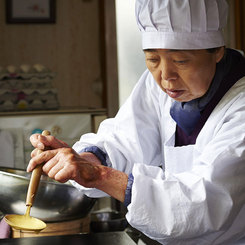Sweet Bean
Jun 02 - Jun 05, 2016
(Naomi Kawase, Japan, 2015, DCP, 113 min)
Seattle premiere!
Known for her meditative, intimate character studies that approach “fiction with a documentarian’s gaze,” Naomi Kawase returns with her new film Sweet Bean, based on the novel An by Tetsuya Akikawa, and premiered in the Un Certain Regard section at the 2015 Cannes Film Festival. The story begins as a reluctant pastry chef, Sentaro (played by Masatoshi Nagase of Jim Jarmusch’s Mystery Train) is visited by an unlikely applicant for part-time help, a 76-year-old woman Tokue (Kiki Kirin), whose difficult past will slowly come to light and alter the younger man’s outlook on life.
About the intimate production process, Kawase said: “During filming, realism is my priority, which was why I asked the actors to really live the lives of the characters they were playing. For example, I asked Masatoshi Nagase, who plays Sentaro, to experience life as the manager of the Doraharu bakery and sell dorayaki pastries himself to real clients who came to buy them. Kyara Uchida, who plays Wakana, agreed to live in social housing for the duration of filming. As for Kirin Kiki, who is Tokue, she learnt to make ‘an,’ the famous red bean paste, and continued until she experienced the passion and enthusiasm of a genuine master baker. The characters thus became authentic.”
The film lovingly and carefully depicts the art of making dorayaki, a sandwich-like treat made from two pancakes held together by an, the sweet bean paste of the title. Kawase’s affinity for spiritual musings comes through in leisure images; two extended sequences of food preparation put the art of creation on full display. The passage of time is marked by changes in seasons, fixing her lens on light glittering through branches, bright cherry blossoms, and the beauty of nature. Like Jiro Dreams of Sushi and Eat Drink Man Woman, it’s the ritual of food preparation that makes it so compelling to watch on screen.
"The undercurrent that runs through the film is a message to learn from nature and enjoy the wonder of life moment by moment, no matter what hard knocks you're dealt.” -Deborah Young
This aspect of the film ties in with the director's earlier work, "A consistent underlying concern of [which] has been the unspoken bond between man and his environment".
“The movie, beautifully shot and acted, earns its ultimate sense of hope by confronting real heartbreak head-on, and with compassion.” -Glenn Kenny, The New York Times
